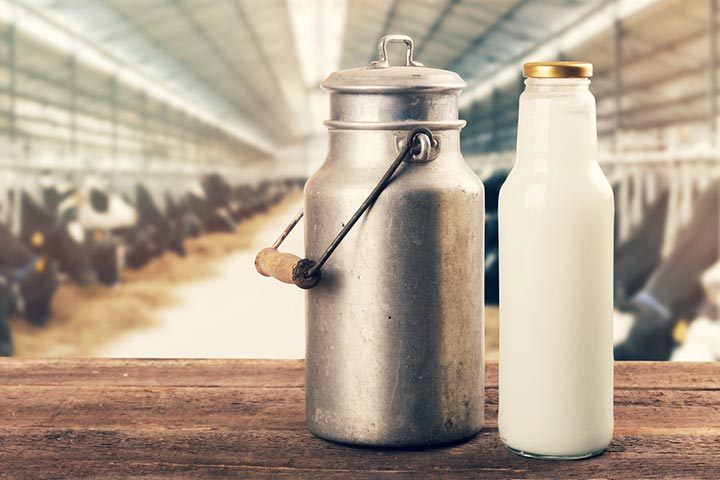Cow milk for babies is the most common alternative to breastmilk. It is a great source of nutrients that can be served independently or added to various baby foods. So if you are considering including it in your little one’s diet, then continue reading this post. Here we talk about the benefits of cow milk, including if it is safe for toddlers and infants and the right quantity to feed your baby.
When Can Babies Have Cow Milk?
Babies can have cow milk only after they are one year or 12 months old, when their body can comfortably process different types of foods (1).
Why Can’t Babies Have Cow Milk Before The Age Of 12 Months?
According to the American Academy of Pediatrics, babies below the age of 12 months cannot digest cow milk as they can breast milk and formula (2). Cow milk also has a high concentration of protein and minerals that can strain an infant’s kidneys. The baby’s stomach and kidneys become stronger after the age of 12 months, which makes it an ideal time to introduce cow’s milk.
But why should you give cow milk to a baby anyway?
What Are The Advantages Of Giving Cow Milk To A Baby?
Cow milk is believed to be a nutrient-rich breast milk substitute and provides the following benefits to the baby (3):
- Benefits muscle development and overall baby growth: Cow milk is high in protein, which babies need in abundance for healthy muscle synthesis and development.
- Good for the circulatory system: Regular consumption of milk is good for maintaining blood pressure, which in turn can benefit the overall circulatory system.
- Helps neurodevelopment:Cow milk contains lipids called phospholipids and glycosphingolipids that play a vital role in the growth of the nerve cells. Experts state that these lipids can be helpful for healthy neonatal brain development.
- Keeps bones healthy: Regular consumption of cow milk helps the baby reach their recommended daily allowance of calcium.
- Several micronutrients help a baby’s general health: Cow milk contains a small quantity of almost all essential micronutrients and vitamins, which provides complete nourishment for babies.
Nutritional Value Per 100g Of Whole Cow Milk
| Nutrient | Unit value per 100 gm |
|---|---|
| Energy | 61kcal |
| Carbohydrates | 4.8g |
| Natural sugars | 5.05g |
| Protein | 3.15g |
| Fat | 3.25g |
| Calcium | 113mg |
| Iron | 0.03mg |
| Magnesium | 10mg |
| Phosphorus | 84mg |
| Potassium | 132mg |
| Sodium | 43mg |
| Zinc | 0.37mg |
| Vitamin B1 (Thiamine) | 0.046mg |
| Vitamin B2 (Riboflavin) | 0.169mg |
| Vitamin B3 (Niacin) | 0.089mg |
| Vitamin B6 | 0.036mg |
| Vitamin B9 (FolateiXNaturally occurring form of Vitamin B9, responsible for protein metabolism and the production of red blood cells ) | 5µg |
| Vitamin A | 46µg |
| Vitamin D | 1.3µg |
| Vitamin E | 0.07mg |
| Vitamin K | 0.3µg |
Source: United States Department of Agriculture (4)
[ Read: When Can A Baby Drink Soy Milk ]
How To Choose The Right Variation Of Cow Milk For Babies?
The cow milk you give to your baby should be:
- Pasteurized and sterilized: Pasteurisation is when the milk is heated at a high temperature for some time, and then rapidly cooled to limit the bacteria and other microorganisms in the milk (5). Sterilization is a process that kills all the microorganisms in the milk, which makes sterilized milk the safest option for babies. You can consider pasteurized milk when sterilized milk is not available.
- Fortified:Milk in itself contains a lot of nutrients, but added nutrients can enhance its nutritional values. Such a process is called fortification. Choose cow milk fortified with vitamins, especially vitamin D. Fortification makes it easier for a baby to attain their recommended dietary allowance (RDA) of essential nutrients.
Can You Give Skimmed Or Low Fat Cow Milk To My Baby?
No. You must always choose whole cow milk for your baby. Babies need fat at their age and skimmed (fat-free) and low-fat (1-2% fat) milk contains very little fat to meet the optimal baby nutrition requirements. Moreover, skimmed and low-fat versions of cow milk contain a high concentration of protein, potassium, sodium, and chloride, which can overload a baby’s kidneys (2) (6).
The concentration of vitamins and minerals is also less in low-fat and fat-free cow milk, which makes whole milk a better option for babies.
Your baby can have low-fat varieties of cow milk after the age of two years. The American Academy of Pediatrics (AAP) states that if a baby is overweight, has high blood pressure, or heart disease, low-fat cow milk can be given after consulting the pediatrician.
How To Introduce Cow Milk To Babies?
Cow milk is hard to digest and should be introduced slowly, starting with small quantities in the beginning. Here is how you introduce cow milk to a baby:
- Start with small sips every day: Your baby may not develop a liking to cow milk right away. Therefore, start with spoonfuls or small sips through a sippy or open cup. It lets the baby get used to the taste of cow milk and become familiar with it.
- Give cow milk in a separate cup: Do not mix any other food item with cow milk the first time you give it to the baby. Pour some cow milk in a separate glass and offer it to the child: this allows the baby to know the taste of milk and lets you understand how the baby’s body reacts to it.
- Increase quantity slowly: If you have given the first cup of milk to the baby today, wait for a day or two before offering more. As you would with other foods, introduce cow milk in small quantities and gradually increase the quantity and the frequency.
- Make it part of a meal or a beverage: Serve milk as an accompaniment to breakfast or evening meal. Cow milk can be a part of the baby’s daily meal plan to meet the recommended daily allowance (RDA) of nutrients it has.
Cow milk could become an integral part of the baby’s diet, but there is a limit to how much the baby can have.
How Much Cow Milk Can A Baby Have?
Pediatric experts recommend no more than 32oz (946ml) of cow’s milk per day for babies. Excess milk consumption can increase the baby’s calorie intake and leave little room for other solid foods that the baby needs. If your baby demands more than the ideal quantity, you can give them alternatives such as breast milk or baby formula.
Can There Be Any Disadvantages Of Giving Cow Milk To Babies?
Cow milk can be disadvantageous to babies below the age of 12 months. It can irritate the inner lining of their stomach and intestine, causing bloody stools. Intense bleeding can cause the onset of iron-deficiency anemiaiXA condition characterized by reduced levels of red blood cells and hemoglobin in the body, which in turn can cause several issues in a baby’s health (6). To avoid that, it is best to wait until the baby is 12 months old before introducing cow milk.
Can A Baby Be Allergic To Cow Milk?
Yes. According to the American College of Allergy, Asthma, and Immunology, approximately 2% to 3% of children under three have a milk allergy. Cow milk protein allergy is the most common among toddlers and young children (7). The symptoms of cow milk allergy include skin hives, nausea, vomiting, abdominal cramps, and diarrhea. The baby’s face could be swollen, and the demeanor could be lethargic. Severe allergic reactions can cause anaphylaxisiXAn extreme reaction to an allergen causing breathing difficulties and loss of consciousness, a condition with serious symptoms.
Zoe, a mother, revealed that her daughter Alyssia was diagnosed with CMPA (Cow’s Milk Protein Allergy) when she was just a few months old. This diagnosis came after they noticed how severe Alyssia’s eczema had become. Zoe explains, “The doctors told us that she might grow out of it and that this could just be a temporary thing, but we have noticed that she gets the same reaction with soya products & after the last time (swelling eyes, diarrhea, eczema rash, colic & vomiting), I am very nervous to try her on any of those foods again (i).”
To avoid triggering an allergic reaction, introduce cow milk in small sips, and then gradually increase the quantity. If you suspect the baby is allergic, then stop giving milk entirely. Otherwise, slowly increase the portion of milk served.
Can A Baby Have Cow Milk Yogurt And Cheese?
Yes. Your baby can have dairy products such as yogurt and cheese made from cow milk after 12 months. Ensure that the cheese or yogurt you buy is without added flavoring, sugar, and color.
Can You Continue Breastfeeding When The Baby Starts Having Cow Milk?
Yes. Medical experts recommend that you continue breastfeeding beyond the age of one year or even two years when the baby has solid foods (8). Hence, maternal lactation can be maintained without pausing or stopping breastfeeding. In addition, continuing to breastfeed while serving cow’s milk can provide additional health benefits to a baby.
Next, we answer a few commonly asked questions about cow milk for babies.
Cow milk is an ideal choice of milk that most parents opt for their babies as it is packed with energy and several vital nutrients. Cow milk for babies also helps them meet their recommended dietary allowance (RDA) of nutrients. However, it is advisable to feed cow milk only to babies aged one and above. Nevertheless, it is best to consult your baby’s pediatrician before introducing cow milk to them. You may also start with small quantities to check for allergies before including cow milk in your baby’s routine diet.
Key Pointers
- Cow milk is appropriate for children aged 12 months and above.
- Cow milk supports muscular growth, aids in cardiovascular health, promotes neurodevelopment, and maintains bone strength.
- Cow milk for infants should be pasteurized, sterilized, and enriched with vitamins, especially vitamin D.
- Consult a pediatrician before introducing low-fat cow milk to children over the age of two.















